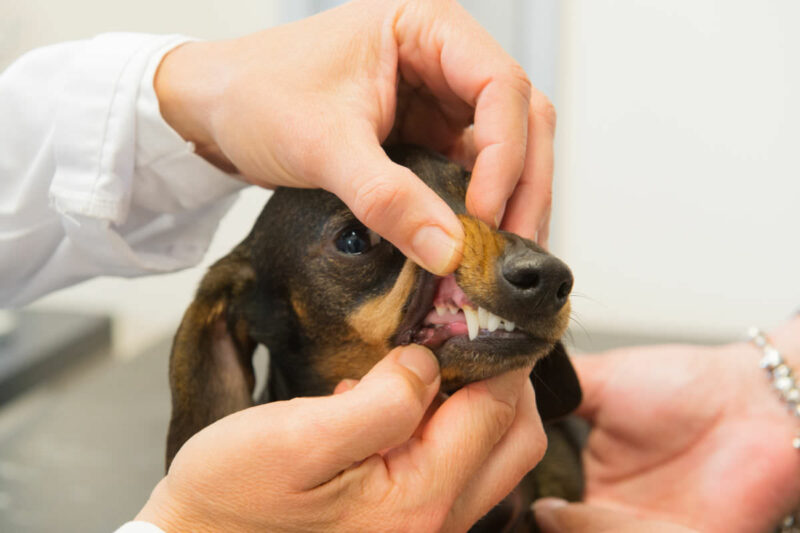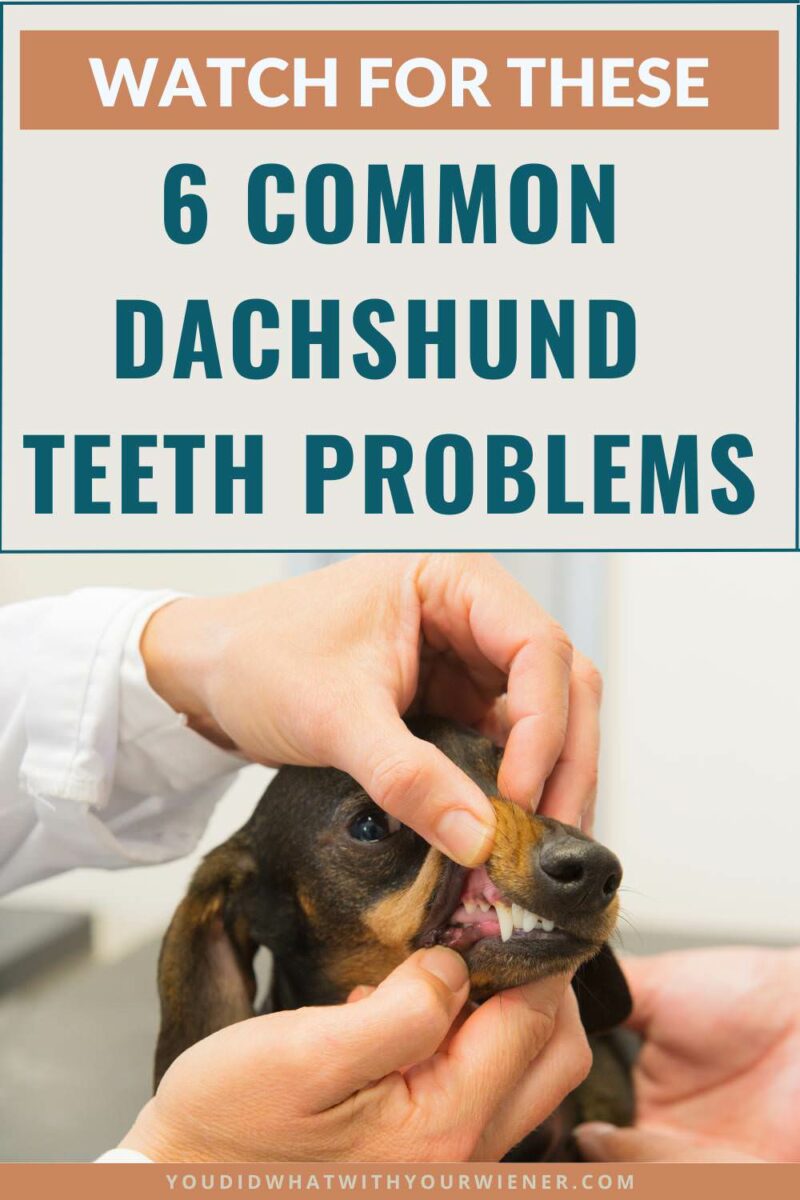6 Common Dachshund Teeth Problems
Dental problems in dogs are often viewed as being a minor inconvenience, but problems with your Dachshund’s teeth could be much more serious than you realize.
In this article, I am going to share the 6 most common Dachshund teeth problems and why you should pay attention to the signs of trouble.
I’m also going to share ways you can keep your Dachshund’s teeth clean, including what I do with Summit and Gretel.

Are Dachshunds Prone to Bad Teeth?
Every breed of dog has associated health issues, and the Dachshund is no exception.
For the Dachshund, this includes dental problems and gum disease (this is true for both miniature and standards).
The primary reason they are prone to dental issues is because they have such long, narrow snouts – squeezing the regular number of dog teeth into a smaller mouth.
Not only does the shape of a Dachshund’s mouth put them at a higher risk of dental issues, but it can also make cleaning their teeth more challenging.
When plaque is allowed to build up on a dog’s teeth, it can lead to things like tooth decay, gingivitis, and gum disease.
Poor dental health can lead to other health complications too, including a weakened immune system, heart disease (like congestive heart failure), and kidney problems.
This is why it’s so important to recognize if your Dachshund is experiencing any dental problems and address them with your veterinarian.
What are the Signs of Dental Problems in Dachshunds?
Some Dachshund teeth problems, like a broken canine tooth, may be easy to spot.
But this isn’t always the case.
In their early stages, dental problems due to plaque and gingivitis are often harder to recognize.
The most common signs of Dachshund dental problems include:
- Nasal discharge
- Sneezing
- Excessive drooling
- Eating on one side of their mouth
- Chewing food more slowly than usual
- Dropping food when eating
- Not eating harder-to-chew food or treats
- Disinterest in their favorite chew toys
- Swelling in the face, muzzle, or gums
- Presence of blood on or around the gums
- Pawing at or itching their face
- Rubbing their face against the ground or items like furniture
- Not wanting to let anyone touch their face
If you notice any of these warning signs in your Dachshund, call your veterinarian.
They will be able to help you identify the exact problem and decide on the best way to treat it to avoid further problems.
6 Common Dachshund Teeth Problems
There are 6 dental issues that are seen regularly in Dachshunds.
Dachshund Double Canine Teeth in Puppies
Puppies are born with 28 teeth.
Like humans, they lose these baby teeth, and their adult teeth will grow in.
Sometimes, these baby teeth fail to fall out.
This is a condition known as persistent deciduous teeth and the most common tooth retained is the canine tooth.
If your Dachshund’s baby teeth remain, it can cause overcrowding or force your Dachshund’s adult teeth to grow in incorrectly.
If you notice that your Dachshund has a persistent deciduous tooth, you should contact your veterinarian.
These teeth can cause long-term problems and often need to be removed (the procedure is most commonly performed during spay or neuter surgery).
My Doxie puppy, Summit had this issue and have to have her canine teeth removed by a veterinarian.
Overcrowding Due to Smaller Jaws
Smaller dog breeds like the Dachshund have been bred over generations to reach their petite lap-sized appearance.
Some genetic traits are more resistant to evolution and breeding selection, changing at a slower pace. This includes tooth size.
The Dachshund, as we know the breed today, has a smaller head than its ancestors but its tooth size hasn’t changed at the same rate.
This causes overcrowding which can cause dental problems, like teeth growing in rotated or misaligned, and makes it difficult to clean your Dachshund’s teeth.
Periodontal Disease and Dachshund Teeth Rotting
Infection and swelling of the gums and tissue around your Dachshund’s teeth is called Periodontal Disease.
This is the most common dental problem in dogs of all breeds and is experienced by more than 2/3 of dogs aged 3 and older.
When plaque and tartar are allowed to build up on your Dachshund’s teeth, it can lead to uncomfortable conditions like gingivitis, cavities, exposed nerves, or rotten teeth.
The pain caused by periodontal disease may stop your dog from being able to eat, and can lead to other health issues, so it’s important to address the problem as soon as you notice any sign that something may be wrong.
Dachshund Teeth Falling Out
During the teething phase, you dealt with your Dachshund’s puppy teeth falling out making way for their adult teeth to come in.
But what do you do if your adult Dachshund is now losing teeth?
There are two reasons why you may discover your Dachshund teeth falling out later in life.
The first is the result of dental problems that are left unaddressed.
Teeth that have been rotting may break free and fall out as the roots become loose or detached.
If your Dachshund has recently experienced trauma in or around their face, you may also see teeth falling out immediately after as a result.
Broken Teeth in a Dachshund
You may notice that your Dachshund’s teeth are chipped, cracked, or broken.
This can be very uncomfortable and painful for your Dachshund as it could expose the sensitive pulp of the teeth.
Teeth usually break because of some sort of trauma or impact.
If your Dachshund was recently involved in an accident that caused damage to their face and muzzle, their teeth may have been broken.
If the break was small, they may not show any signs that something is wrong at first.
But many cracks and breaks will get worse over time if they aren’t taken care of.
Another common cause of broken teeth in a Dachshund is from chewing on something that is too hard.
When choosing treats, toys, and chews for your Dachshund, make sure that it isn’t rock solid.
You can test this by pressing your thumbnail into the chew.
If the chew or toy doesn’t have a little “give”, or your thumbnail doesn’t make a small indent, then it is too hard and could break their teeth.
Note: these harder chews can still be given but the risk must be recognized. Closely supervise your dog and take the chew away if you are nervous or see any issues.
Some items that are more likely to cause this problem are antlers and larger cooked bones.
Teeth Chattering or Grinding
A Dachshund that is chattering their teeth is often associated with pain.
This is a true concern, and you should check for signs of dental problems if you notice any chattering.
But that’s not the only explanation for this behavior.
Your Dachshund may start chattering their teeth for a wide variety of reasons ranging from fear to over-excitement.
Does your Dachshund get overly excited about things like their favorite toy or the sound of you filling their food dish?
If so, you may see that excitement expressed through body shakes and chattering or grinding teeth.
My Dachshund Gretel chatters her teeth when she is anticipating dinner.
How You Can Help Prevent Dental Problems in Your Dachshund
The most important thing that you can do to prevent Dachshund dental problems is to clean their teeth regularly.
You may have heard the recommendation to brush your Dachshund’s teeth a couple of times each week, and yes, that is the ideal approach.
But that’s not the only option.
I tried brushing my dogs’ teeth but quickly realized that it wasn’t the right option for us.
There are many great products available, depending on what your Dachshund will let you use and how they fit into your lifestyle.
This includes dental gels, sprays, water additives, dental treats, chews, and toys designed to scrape the plaque and tartar off.
One important step that you can take to prevent Dachshund teeth problems is to make an appointment with your veterinarian for a professional cleaning.
This is available both as a cleaning under anesthesia and a non-anesthesia cleaning (in some areas).
When deciding on which cleaning option is ideal for your Dachshund, there are a few factors to consider:
- Price (I did a lot of research into the cost of dog dental cleanings)
- Any history of complications with anesthesia
- Whether any Dachshund teeth problems need to be addressed that may require anesthesia like a tooth extraction
- Your Dachshund’s comfort level with having their teeth cleaned
- If your Dachshund needs x-rays (this can only be done under sedation)
There are a lot of negative opinions about anesthesia-free teeth cleaning, but I disagree.
I am not a veterinarian, and this is my personal opinion, but I have done a lot of research and made what I believe is the best choice for my family.
Anesthesia-free cleanings have worked well to safely help keep my Dachshund’s teeth free of plaque.
Final Thoughts
Dachshunds, and small dogs in general, are prone to dental problems and gum disease.
When a dog’s mouth is smaller, teeth can have a tendency to get over-crowded.
This can directly cause issues like loose teeth, missing teeth, oronasal fistulas, and more.
Poor dental health can lead to other health complications too, including a weakened immune system, heart disease, and kidney problems.
Creating a home routine for helping to keep your dog’s teeth free of plaque can help prevent related diseases and help protect their overall health.
You can do this by brushing their teeth or regularly, giving them a plaque softener and chews to scrape the plaque off themselves, or using another dog dental cleaning product.
In addition to plaque and gum disease, Dachshund teeth problems can also be caused by their aggressive chewing style.
If given a chew that is too hard, they are prone to cracking and breaking teeth.
Therefore they should be monitored while chewing and the hardest of chews are best avoided.


About the Author
Hi, I’m Jessica. I’ve been studying the Dachshund breed since 2007, owned 3 of my own, and shared in the lives of thousands of others through their owner’s stories. When I’m not sharing what I know on this blog, you can find me hiking, camping, and traveling with my adventurous wiener dogs.

My older dachshund, which I’ve only had a year, was diagnosed with what the vet called Stage 4 dental disease today and I was told several teeth needed to be removed. I have never done anything to clean his teeth other than Plaque powder and dental chews–which obviously aren’t doing the job. What do you suggest for better cleaning in the future–providing he survives all this horror of surgery!!!
Hi Ferne. Unfortunately, the majority of dog dental health (or not) comes down to genetics. Personally, I help keep my Dachshund’s teeth clean like you, although to be clear, I don’t use commercial “dental chews” because they aren’t tough enough, or last long enough, to scrape sufficient tartar off of the teeth. I use natural chews like bully sticks, tendons, cow ears (fur on), etc. Brushing your dog’s teeth is what most veterinarians recommend but, it my experience, that is not always superior to the system I am using. You could try doing both though.